Music and Theatre Department 2.0
Photo courtesy of Anna McKinzey.
Musical Theatre students performing in the 2019 musical, ‘Urinetown.’
February 1, 2022
Back to the Course Catalog here.
Drama I
If you’re searching for the perfect elective to have a creative outlet, then look no further than Drama I.
“It’s really fun, and you get to find a sense of self,” said Aria Cates. “We do a lot of different acting exercises like mirroring and stuff like that.”
This class focuses on the “basics of acting” according to Katie Mogilski.
“You learn a lot about different styles of acting, how to approach the whole business and the history of it,” said Mogilski. “It’s just an overall fun and creative class.”
Students should be warned, though, that they will terribly upset if they sign up for this class thinking it will be a free period because participation is a huge factor in the grading system.
“You’re graded on participation every day. So if you raised your hand, you participated in the exercises, it’s mainly that,” said Cates. “If you participate, yeah, [it’s an easy A]. If you sit down on your phone every day it’s not gonna work out.”
Because of this, one should only sign up for this class if they have enthusiasm for the subject.
“I mean if you think you’re interested in theater, do it, but if you’re not interested in theater don’t do it as like an easy class because it’s a lot of stuff,” said Rosemary Cochran.
While it may be a lot of “stuff” the work is generally fun and engaging, with tasks ranging from “scenes and monologues” to improv.
This class is also a great way to meet other students who share the same interests.
“The best part of the class is meeting new people, bonding with them, and then performing with them,” said Lucy Samuels (‘22).
The course-load consists mainly of “memorization quizzes and mini-scene writings,” but it is nothing a dedicated student can’t handle, and by some was even described as “light.”
“It’s a perfect balance. I never worry about the class even with all my other core classes,” said Samuels. “You definitely have to put some hard work in, but it’s fun work!”
Musical Theater I
After Drama I, students can move to Musical Theater, a “very fun, creatively challenging class,” said Bridget Dowdakin, who selected this course because of her passion for the subject.
“I am so in love with singing and theater and I was like ‘Oh my gosh they have a musical theater class,’ so I was just very excited to dive into that,” said Dowdakin.
This course should only be recommended, though, to those with the same passion as Dowdakin.
“If you are into singing and dancing and acting then I would definitely recommend it to you,” said Phoenix Rosso. “If you think it’s maybe like an easy A or like an elective that you don’t have to try that hard in, I wouldn’t recommend it because it’s the total opposite.”
The reason for this is that musical theater students are required to participate in the fall One Act and the spring musical.
“You can sign up and be part of the crew if you don’t feel like you would like to be part of the cast, but everyone is required to participate in some way,” said Madeline Gregory.
The great part about this, though, is that the students are able to see a clear end result to their hard work.
“I think one of the best parts of the class is like watching the shows come together,” said Marion Holt.
But as long as students participate and complete their work in a timely manner, the class is “so manageable.”
“It’s a pretty easy class as long as your participate and show up,” said Gregory. “We do have assignments at the end of the year that if you don’t turn in it can affect your grade.”
Articles featuring the class:
Chamblee OnStage Returns After a Long Wait in the Wings
Thursday and Friday in the Park with George
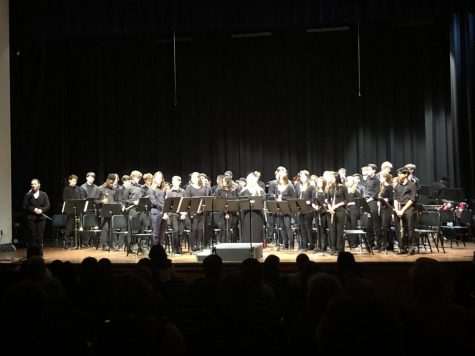
Beginning Band
For those just beginning their music career, or continuing it from middle school, look no further than band class. Described by Mia Yeager as “fun yet educating,” this class is a great break in the middle of a stressful school day.
“It’s really fun because it’s kind of a break from all the APs and all the schoolwork we have to do,” said Ashika Srivastava (‘22). “Concerts are really nice. You go and play for all the parents and teachers. It’s a great way to relax.”
The grades for this class mainly consist of participation, but every two weeks the students have playing tests.
“My least favorite part is the assignments. We have playing tests every two weeks,” said Justin Smith. “They’re not super hard, you just have to practice.”
For Yeager the amount of playing tests is “just right” for this type of class.
If a student has never touched an instrument before in their life, this class is still open, and even suggested for them.
“There are a lot of kids in ninth grade that just got put in the class, and they just took up an instrument and they love it. They’re advancing now. It’s really easy to learn,” said Srivastava. “But if you’re not committed, then don’t do it because it’s really like a four-year commitment. It’s like a waste if you drop out.”
If a student is willing to practice and prepare for playing tests, then they should do just fine in this class.
“If you do all your work- which is not a lot- and participate then it is a very easy A,” said Yeager.
Recent articles featuring the class:
Long Time No Play: Live Concerts Return to Chamblee
Percussion Ensemble (Musical Ensemble)
Percussion Ensemble is a band class currently exclusively during first period meant to highlight percussion instruments, using no wind instruments.
“Percussion Ensemble is a fun class. It’s definitely different from other band classes where you get to fully experience all of the different percussion instruments rather than playing only with the band. You get solos as well as entire group pieces that your friends can play,” said Mateo Hunter (‘23).
The class has no prerequisites and encourages those who have never played percussion before to join. “The class goes from beginner percussionists all the way to people who play percussion for years. I’ve played for seven years, but in percussion [ensemble], everyone has a job and we’re all able to work together and produce music only through percussion instruments, which is pretty cool, being that normally we only play with the band,” said Hunter.
The class allows students to learn skills for every percussion instrument at Chamblee, and they often rotate around to different parts on different songs.
“You get to learn how to drum as well as how to do mallets and then pretty much everything that a percussionist can do you’ll touch on, which is pretty cool, because then you can take those skills and use them later,” said David Artigue (‘25).
It also gives percussionists a chance to shine on their own, not behind the band.
“I only used to play the easy parts, but now since there’s more focus on me, Mrs. Marin helped me get better and she encourages me to do harder parts and it’s actually good because I learn more things,” said Sai Akshat Chitta (‘25).
Students in the class say you should be prepared to begin the day actively playing, but that it’s a fun and relaxed environment. “Every day you learn more. You just just go in and learn and just play and have a good time,” said Larry Smith (‘22).
Students generally don’t consider the class an easy, free period since you have many instruments and songs to learn. “It’s like a real class,” said Jackson Smith (‘23). The class involves solo assignments to improve outside of ensemble work, as well as group pieces.
“I think if someone is interested in the class, they should try it. It’s a great way to start my day. […] You actually have to put in work. We play different pieces in little ensembles, and everyone in the ensemble is counting on everyone else in that ensemble to learn their part and learn it correctly. […] If you’re just looking for a free class to take, don’t take percussion ensemble,” said Phinn Adams (‘22).
Guitar Class
This year, Orchestra Director Philip Barnard introduced an introductory guitar class to Chamblee. He hopes to expand the class into a second advanced guitar class next year as well.
For students who don’t want to pick up a trumpet or cello, and have an interest in more contemporary music, this beginning class offers the chance to learn how to read music as well as how to play the chords on a guitar.
“It’s okay, if you have absolutely no knowledge of the guitar, you get all the basics done,” said Alex Barrita (‘24).
The class allows students to play in groups as well as alone.
“A lot of the times he assigns a song into groups, and we would […] play one part in harmony […] and it just sounded pretty awesome,” said Barrita.
The class is described as having no homework as well.
Olivia Kerr (‘23) described it as “a good pathway if you want to do something musical.”
“I definitely recommend it. It’s a lot of fun and it’s definitely cool to learn something new […] that you haven’t known how to do before and that you want to do,” said John Persichilli (‘23).
Beginning Women’s Chorus I
Beginning Women’s Chorus I, also known as Treble Chorus, is one of two introductory chorus courses at Chamblee. The course is taught by Linda Lirette, who also teaches Chamblee’s drama and musical theater courses.
The other introductory chorus course offered is Beginning Mixed Chorus I, with the primary difference between the two courses being the pitches of student’s voices.
“Treble chorus is just for higher voices. Mixed chorus is just more of a blend and there are more guys because their voices are pretty much lower.” said Lyvia Huang (‘25). “The main difference is just the pitches, the different range we cover. And treble chorus is mostly with high pitches and things like that.”
An additional difference between the two classes is their size, with students reporting that Beginning Women’s Chorus I has around twenty-five students and that Beginning Mixed Chorus has around fifty to sixty students.
Many of the students in the class took chorus as a class in middle school and chose to continue taking it in high school.
“I was in chorus in middle school, so I was going to be in chorus in high school. It was one of the options,” said Hansika Dinasarapu (‘25).
Students are required to audition for the class, which in the past has involved submitting both singing and writing samples.
“It was virtual last year, but it was submitting a clip of using scales and then a song. And then you had to write an essay about yourself and why you wanted to be in chorus,” said Huang.
Lirette is described by students as being a good teacher, who is able to help students both inside and outside of class.
“She’s a really good teacher. She doesn’t yell at students ever, which I think is really nice. She’s interested in helping you learn and grow as an artist, to socialize, help you with extracurricular opportunities, if you’re interested in those,” said Huang. “She’s a good director as well. She put on the performances really well and she’s in charge of the musicals too.”
Students interviewed would recommend this class to other students who like to sing, highlighting interacting with students of other grade levels as one benefit. Dinasarapu described the class as “lots of fun”.
“[I would] definitely [recommend it]. I think if you would like to sing, it’s also been a great way to get to know people, especially outside of your grade, because people of all grades are in chorus. And performing together is just a fun bonding experience for them,” said Huang.
Overall, students appreciate the class’s fun environment and the contrast with a traditional classroom environment.
“Chorus is a relaxing class to have, you know, a break. You’re in classrooms and doing work all day. It kind of feels great cause it’s fun,” said Huang.
Beginning Mixed Chorus I
Beginning Mixed Chorus I is one of two introductory chorus courses at Chamblee. The course is taught by Linda Lirette, who also teaches Chamblee’s drama and musical theater courses.
The other introductory chorus course offered is Beginning Women’s Chorus I, also known as treble chorus. The primary difference between the two courses is the pitches of student’s voices, with an additional difference being class size, with students reporting that Beginning Mixed Chorus has around fifty to sixty students and that Beginning Women’s Chorus I has around twenty-five students.
Made up of all grade levels, the class is intended to allow students to develop their performances and knowledge of mixed choral singing. The course description for the class includes that it “covers performance and production, analysis and theoretical studies, historical and cultural contributions and influences, creative aspects of music, and appreciation of music.”
“[It is] a class where you learn a little bit about singing as you’d expect, with guys and girls. You get to learn how to read music. You learn your solfège and you learn some cool songs,” said Alek Dyer (‘22).
Students interviewed describe some students in the class participating less than others, with
“Half of the students didn’t really do anything and then the other half kind of just sat there, but there were like ten people who tried. It was a lot of different things going on, but also nothing at the same time,” said Malena Amador (‘23).
Despite the lack of motivation of some students, interviewed students highlight Lirette’s knowledge as a teacher.
“She’s very educated in the field and she’s great. She can be a little bit soft at times when students are kind of unmotivated and lazy, but other than that, she’s really great,” said Dyer.
Amador adds that the large class size makes it challenging for a teacher.
“I think she tried, but also it’s hard to tame fifty to sixty students. But you could tell she definitely likes chorus and music and all that,” said Amador.
Overall, students had mixed opinions on recommending the class to others. As a musician, Dyer found the class has taught him new skills and been an enjoyable experience.
“I think a friend told me that if I was into the arts, but wasn’t really into theater much, then I could join chorus. And as a musician, it seems pretty appealing to have that as a skill set. So that’s why I joined.” said Dyer. “[I would] absolutely [recommend it]. It’s lots of fun. You get to perform as well.”
AP Music Theory
For students that have a love for music and want to understand the logic that goes into composition, AP Music Theory might just be the perfect class because students, as described by Kendall Young, get to “[learn] the fundamentals of how music is written and how to analyze written music in the best way possible.” The class focuses mainly on composition rules, but also the exemptions to these rules, and “why and how they [composers] deviate from these standards.” As a project, the students get to show off their newly acquired knowledge by composing their own original piece.
The students that chose to take this class generally had a long history already with music. For example, Nicholas Osselette took it because he “wanted to better my knowledge,” whereas Samantha Hopper wanted the chance to take a class that would be different from the rest of her schedule.
“I knew that I wasn’t going to get a lot of opportunities in the future to get to just learn something that was interesting to me,” said Hopper.
The general consensus of students in the class is that you should only take this class if you are willing to put in the work.
“If you’re considering the class then I would take it because it’s like a good way to expand your knowledge of music so you can sound better while playing,” said Kendall Young. “But if you just want to take it for your friends that are in it, then don’t do it because it’ll be really hard, and you won’t like it.”
There is a lot of work for the class and can take up a lot of time in the afternoon.
“I would recommend it to people with very light workloads who have lots of time to dedicate to the class because you have to work on it at least two hours a day, especially training your ear,” said Alexandra Jepson. “If you have perfect pitch, I’d take it but if you don’t, then I’d rethink it.”
The reason perfect pitch is helpful for this class is because they often have “oral quizzes” in which they must identify three chords being played for them.
While there are a lot of assignments that go along with this class, all that take it are happy that they did, and feel that getting an A is quite possible.
“I’d say it’s an easy A if you do you’re homework. If you don’t do your homework, you’re not gonna learn the content and it’s gonna suck,” said Hopper. “The 45% category is mostly completion work, so you’re homework, so it’s not that bad.”
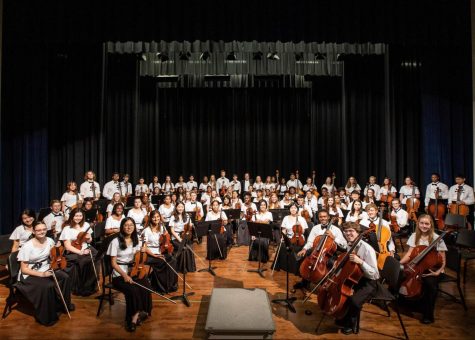
Orchestra
Orchestra is a performing arts elective class at Chamblee, taught by Philipp Barnard. Students of all musical levels are welcomed, although most students in the class began learning their instruments prior to coming to Chamblee. It has multiple levels to fit students skill levels and can be used, like band and chorus, to receive a fine arts diploma seal when graduating.
“It’s fun to play music and it’s fun to take your mind off grades and other classes,” said cellist Eli Ritchey (‘25). “ It’s just fun to get your mind off things in other classes and tests.”
Students in orchestra have outside of class perks like concerts and trips to other cities, which aid in their learning and give them a chance to play outside the normal school day. These music trips in the past have been in collaboration with band and chorus to places like New York City.
Most students’ favorite part of the class is the concerts, which allows them to show off their music. “[My favorite part is] the end result because you’ll be practicing a piece for like a couple of months and then perform it at a concert and you can see how far you’ve come,” said Abdulahi.
The typical day in class has a set routine. “We come in, we tune, sometimes we practice technical skills, and then we just play music,” said Ritchey.
Orchestra also gives the students lots of opportunities outside the class, like a musical honor society, but also inside the class. “I like how we have a senior in the class. She conducts the orchestra; she’s kind of like a second teacher,” said violinist Anya Gant (‘25).
The class has little work outside the student’s own interest and time commitment in their instrument. “We just practice. So that’s really your only homework,” said violin player Ladon Abdulahi (‘24).
The classroom environment is described as “quiet, yet it can still be rowdy at times,” by bassist Andrew Cole (‘24).
The students love “Mr. B because he’s very nice and funny and he doesn’t like to scold us. Even if we’re bad, he encourages us to be better,” said Abdulahi.
According to Ritchey, when involved in orchestra, you should “just have fun. Enjoy it.”

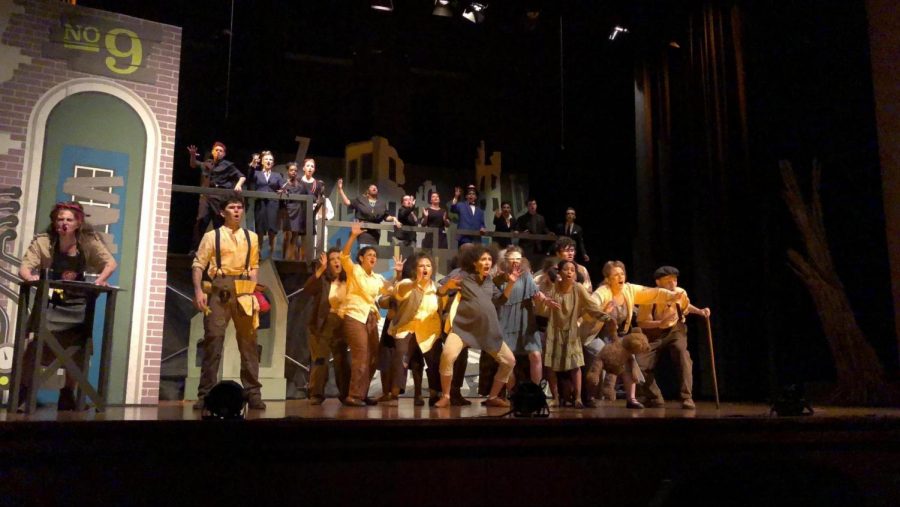
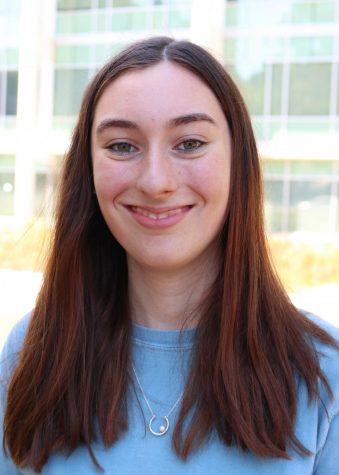
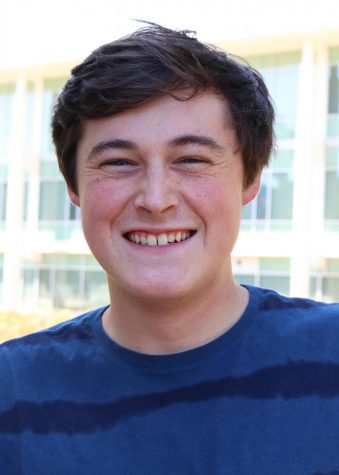
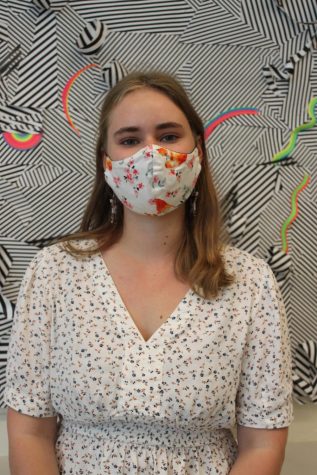










Francesca M • Apr 27, 2022 at 1:21 pm
It is always a joy to see their performances.